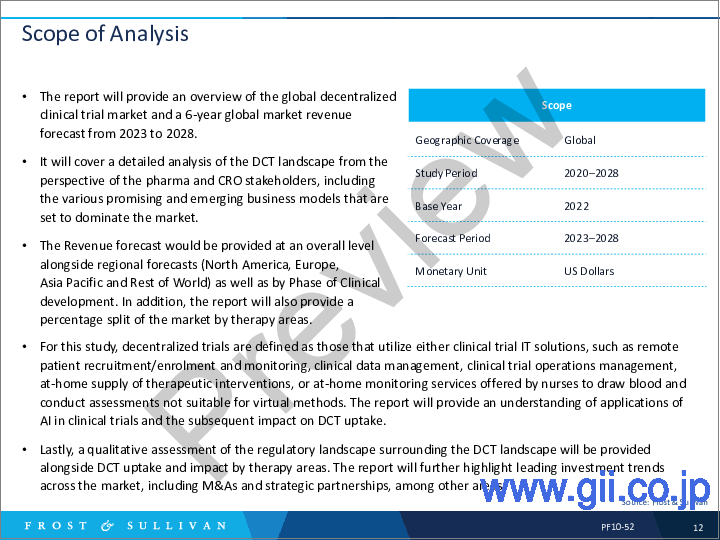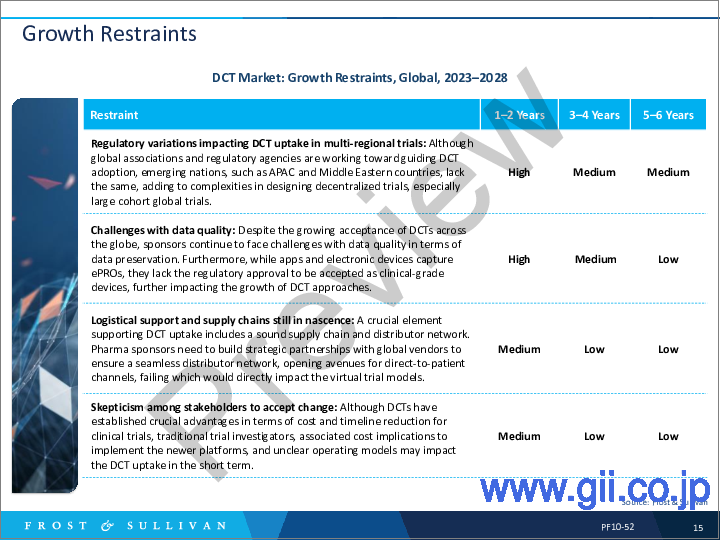|
|
市場調査レポート
商品コード
1358186
世界の分散型臨床試験の成長機会Global Decentralized Clinical Trials Growth Opportunities |
||||||
|
|||||||
| 世界の分散型臨床試験の成長機会 |
|
出版日: 2023年09月15日
発行: Frost & Sullivan
ページ情報: 英文 84 Pages
納期: 即日から翌営業日
|
- 全表示
- 概要
- 目次
競争激化が世界各地でDCTイニシアチブを推進パートナーシップに基づく成長モデルへの道を開く
世界の分散型臨床試験(DCT)市場は、COVID-19パンデミック以降、継続的な急成長を遂げています。2020年にDCTの導入が加速した背景には、治験を実施する治験責任医師、治験協力者、患者の治験参加への移動が制限され、世界的に治験活動が大幅に停止したことがあります。患者の安全性と研究開発活動の継続性を確保するため、ほとんどの治験依頼者と医薬品開発業務受託機関(CRO)は、遠隔医療、リモートソースデータ検証、センサー/モバイル技術に対応した直接データキャプチャソリューションなど、治験業務をサポートするデジタルツールを採用しました。
世界中の規制機関は、DCTの認知度向上を目指すDTRA(Decentralized Trials &Research Alliance)のような既存のアライアンスと並んで、DCTモダリティの大規模な導入に向けたイニシアティブやガイドラインを打ち出しており、遠隔試験の導入を後押ししています。
北米はDCTベンダー、CRO、製薬スポンサーが強い存在感を示しており、DCT市場をリードし続けています。とはいえ、アジア太平洋地域は、患者の多様性、未治療人口、大幅なコスト優位性などを背景に、複数の大手世界CROが強固な基盤を確立しており、重要な地域となってきています。加えて、同地域では遠隔医療やePharmacyソリューションへの依存が高まっており、3~5年後にはDCTの普及が進むと思われます。世界のその他の地域では、サウジアラビアとドバイを筆頭に、中東が遠隔裁判の導入拡大に向けた準備を進めています。オラクルやAWSなど複数の技術ベンダーがこの地域に拠点を構え、eClinicalソリューションの導入を可能にし、成長を促進しています。しかし、現在のところ、同市場の成長は他地域に比べて比較的緩やかです。
目的に適合したクラウドベースのプラットフォームソリューションを通じて、分散型臨床試験をサポートする必要性が常に存在します。そのため、CROはテクノロジーベンダーと提携することで、分散型試験の機能を構築しています。さらに、患者向けのオンライントレーニングモジュールや、デバイス、チャットボット、センサーを利用した在宅試験モニタリングのためのセキュアテクノロジーが、パンデミック後の分散型試験の採用を後押ししています。
身体障害や場所によるアクセス制限のある患者のための在宅医療サービスは、臨床試験の継続を促進することができます。ポータブル機器の使い方のトレーニングを受けた看護師がサポートする在宅医療サービスプロバイダーと提携することで、DCTの円滑な実施が促進されます。さらに、CROは、アドボカシーグループ、ソーシャルメディア、オンライン医師紹介システムの利用、AI対応プラットフォームの導入など、複数のチャネルを模索し、DCTエコシステムを拡大することで、試験登録と患者エンゲージメント戦略の革新に注力しています。
目次
戦略的課題
- なぜ成長が難しくなっているのか?
- The Strategic Imperative 8(TM)
- 分散型臨床試験(DCT)業界における上位3つの戦略的重要事項のインパクト
- 成長機会がGrowth Pipeline Engine(TM)を後押しする
成長機会の分析:分散型臨床試験市場
- 分析範囲
- 分散型臨床試験市場のセグメンテーション
- 成長指標
- 従来型臨床試験と分散型臨床試験の比較
- DCTの価値提案患者中心主義の実現
- 分散型臨床試験医薬品エコシステム
- 分散型臨床試験患者エコシステム
市場スナップショット
- 市場動向分析
- 進化するDCT情勢
- 世界のDCTイニシアチブとガイドライン
- DCTイニシアチブが世界のDCT市場に与える影響
- DCTへの取り組みが個々の利害関係者に与える影響
- 成長促進要因
- 成長阻害要因
- DCT:進化するベンダーエコシステム
ビジネスモデル動向
- ビジネスモデル動向:世界のDCT市場
- DCTビジネスモデルを牽引するパートナーシップ動向
- DCT市場における戦略的パートナーシップ
M&Aやプラットフォーム/製品立ち上げ別能力拡大
- 主要なM&A
- 新しいプラットフォームの立ち上げ
成長機会の分析:収益と予測分析,世界
- 予測の前提条件
- 収益予測:世界
- 収益予測分析
- 臨床開発フェーズ別収益予測
- 開発フェーズ別収益割合
- 臨床開発フェーズ別収益予測
- 治療領域別収益シェア分析
- 治療領域別収益シェア分析
成長機会分析:地域別収益予測分析
- 地域別収益予測
- 地域別収益予測分析DCT市場
- 収益予測分析:北米
- 収益予測分析:北米欧州
- 収益予測分析:欧州アジア太平洋(APAC)
- 収益予測分析:アジア太平洋(APAC)世界のその他の地域(RoW)
競合環境
- 競合環境
- 競合ベンチマーキング:ピュアプレイDCTベンダー
- 競合ベンチマーキング:CRO(イネイブラー/DCTベンダー)
- 競合のベンチマーキングDCTイネイブラー
- 競合評価
成長機会ユニバース
- 成長機会1:デジタルバイオマーカーによるエンドポイント評価
- 成長機会2:デジタルヘルス技術(DHT)を活用したオンコロジー試験への注力
- 成長機会3:DCT能力を拡大するためのパートナーシップベースのアプローチの採用
次のステップ
- 次のステップ
- なぜフロストなのか、なぜ今なのか?
- 別紙リスト
- 免責事項
Strong Competitive Intensity is Advancing DCT Initiatives Across the World Paving Way for a Partnership-based Growth Model
The global decentralized clinical trial (DCT) market has been witnessing a continued surge after the COVID-19 pandemic. The accelerated DCT adoption in 2020 was driven by restricted mobility of site investigators, clinical research associates, and patients to participate in trials, which resulted in a significant halt in trial activities worldwide. To ensure patient safety and continuity in the R&D activities, most sponsors and contract research organizations (CROs) adopted digital tools to support trial operations, including telemedicine, remote source data verification, and sensor/mobile technology-enabled direct data-capture solutions.
Regulatory agencies around the world are coming up with initiatives and guidelines for large-scale adoption of DCT modalities, alongside existing alliances, such as Decentralized Trials & Research Alliance (DTRA), that work toward increasing DCT awareness, propelling remote trial uptake.
North America continues to lead the DCT market owing to a strong presence of DCT vendors, CROs, and pharma sponsors in the region, followed closely by Europe, which has abundant infrastructure for large-scale DCT uptake. Nevertheless, Asia-Pacific is emerging as a crucial region with several leading global CROs establishing strong bases due to patient diversity, treatment-naive population, and significant cost advantage. In addition, there is a growing reliance on telemedicine and ePharmacy solutions in the region, which will propel DCT uptake in 3 to 5 years. In the Rest of World region, the Middle East is gearing up for greater remote trial adoption, with Kingdom of Saudi Arabia and Dubai at the forefront. Several tech vendors, such as Oracle and AWS, have set up bases in the region to allow the uptake of eClinical solutions, promoting growth. However, at present, the market will have comparatively slower growth than other regions.
There will be a constant need to support decentralized trials through cloud-based platform solutions that are fit to purpose. Therefore, CROs are building decentralized trial capabilities by partnering with technology vendors. In addition, online training modules for patients and secure technology for at-home trial monitoring through devices, chatbots, and sensors have been driving the adoption of decentralized trials after the pandemic.
Home health services for patients with physical disabilities and restricted access due to location can promote retention in clinical trials. Partnering with home health service providers supported by nurses trained in portable equipment usage will facilitate smooth DCT implementation. In addition, CROs are focused on innovating trial enrollment and patient engagement strategies by exploring multiple channels, such as the use of advocacy groups, social media, and online physician referral systems, as well as implementing AI-enabled platforms, expanding the DCT ecosystem.
Table of Contents
Strategic Imperatives
- Why Is It Increasingly Difficult to Grow?
- The Strategic Imperative 8™
- The Impact of the Top 3 Strategic Imperatives on the Decentralized Clinical Trial (DCT) Industry
- Growth Opportunities Fuel the Growth Pipeline Engine™
Growth Opportunity Analysis: Decentralized Clinical Trial Market
- Scope of Analysis
- Decentralized Clinical Trials Market Segmentation
- Growth Metrics
- Comparison of Traditional and Decentralized Clinical Trials
- DCT Value Proposition: Achieving Patient Centricity
- Decentralized Clinical Trials: Pharma Ecosystem
- Decentralized Clinical Trials: Patient Ecosystem
Market Snapshot
- Market Trend Analysis
- Evolving DCT Landscape
- Global DCT Initiatives and Guidelines
- Implications of DCT Initiatives on the Global DCT Market
- Implications of DCT Initiatives on Individual Stakeholders
- Growth Drivers
- Growth Restraints
- DCT: Evolving Vendor Ecosystem
Business Model Trends
- Business Model Trend: Global DCT Market
- Partnership Trends Driving DCT Business Models
- Strategic Partnerships in DCT Market
Expanding Capabilities with M&As and Platform/Product Launches
- Key Mergers and Acquisitions
- New Platform Launches
Growth Opportunity Analysis: Revenue Forecast Analysis, Global
- Forecast Assumptions
- Revenue Forecast: Global
- Revenue Forecast Analysis
- Revenue Forecast by Phases of Clinical Development
- Revenue Percentage by Phase of Development
- Revenue Forecast by Clinical Development Phases
- Revenue Share Analysis by Therapy Areas
- Revenue Share Analysis by Therapy Areas
Growth Opportunity Analysis: Revenue Forecast Analysis, By Regions
- Revenue Forecast by Regions
- Revenue Forecast Analysis by Region: DCT Market
- Revenue Forecast Analysis: North America
- Revenue Forecast Analysis: Europe
- Revenue Forecast Analysis: Asia-Pacific (APAC)
- Revenue Forecast Analysis: Rest of World (RoW)
Competitive Environment
- Competitive Environment
- Competitor Benchmarking: Pure-play DCT Vendors
- Competitor Benchmarking: CROs (Enablers/DCT Vendors)
- Competitor Benchmarking: DCT Enablers
- Competitor Assessment
Growth Opportunity Universe
- Growth Opportunity 1: Endpoint Assessment with Digital Biomarkers
- Growth Opportunity 2: Digital Health Technology (DHT)-enabled Focus on Oncology Trials
- Growth Opportunity 3: Adopting Partnership-based Approaches for Scaling DCT Capabilities
Next Steps
- Your Next Steps
- Why Frost, Why Now?
- List of Exhibits
- Legal Disclaimer






